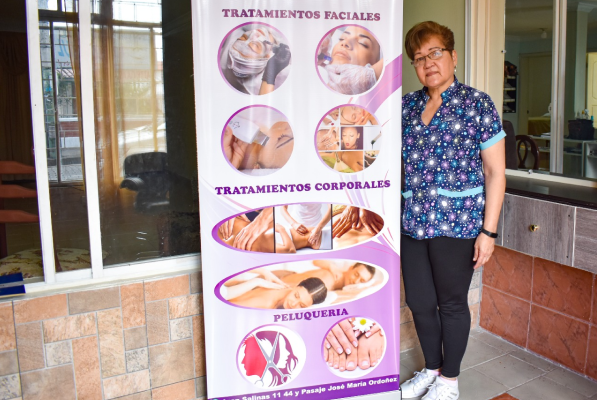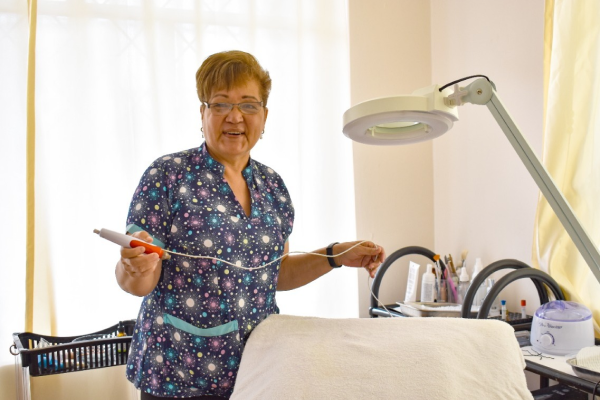In spite of tragedy, Venezuelan refugee Xiomara finds beauty in life—and others
November 23, 2022
Xiomara believes that beauty is far more than skin deep.
As the owner of Xiomi Centro de Estética Integral (Integral Esthetic Center), Xiomara brings an extra level of attention to her facial and body treatments, seeing clients of all ages at her shop in the town of Ibarra, near the Ecuadorian capital of Quito.
”We treat and see the human as a whole being,” explains the 66 year-old of her holistic philosophy that improving one’s physical appearance can boost one’s emotional outlook, and vice versa.
“Beauty comes from inside out.”
Though she holds a degree in nursing from the University of Venezuela, Xiomara had begun a second career as an esthetician before migrating to Ecuador with her husband to live closer to their daughter, son-in-law and grandson, who left their home country to escape the dire economic and political climate. After the move, a Kiva loan helped Xiomara purchase a treatment bed and other supplies vital to her new trade.
“At the start I had to get money from those people who loan money daily in order to buy my equipment,” she says, alluding to the many high-interest loan sharks who operate around town. “This was difficult, as I had to pay every day.”
After some Venezuelan friends introduced her to a local Kiva Lending Partner, CACMU, Xiomara was able to move to a larger space and expand her services, including providing deep-cleaning treatments and making her own signature creams.
“Now I can ensure greater care and quality of service thanks to the better equipment,” she says.
Learn more: How microfinance supports livelihoods in developing countries
Beset by tragedy, she found the will to carry on
“Facing any and all circumstances, we need to fight, persist…find the people who can help and support us.”
When Xiomara first arrived in Ecuador, she helped her husband, a baker, with his business selling confections at a nearby hospital and university. Their daughter took care of the marketing, and everything was going well for the family—until pancreatic cancer took their daughter’s life.
“She was really committed to fighting and to continue living, but unfortunately she did not make it,” says the bereaved mother.
Sadly, there was more heartbreak to follow. As the pandemic spread throughout the world in 2020, Xiomara lost her husband to COVID-19. The challenges of being a refugee in a foreign country compounded by these tremendous losses weighed heavily on her, but through her faith and extraordinary inner strength, Xiomara carried on.
“Facing any and all circumstances, we need to fight, persist,” she muses. “I think this is very important, and also find the people who can help and support us.”
Finding support in the microfinance community
“Obviously we have to put the work in and go through the necessary business stages—and they’ve given us these tools.”
In spite of losing her loved ones, Xiomara refused to return to the hardships of Venezuela and remained committed to staying in Ecuador to look after her grandson, who was now a young adult. To make a living, she revived her esthetician business with a microloan from Kiva Lending Partner CACMU.
Officially known as Cooperativa de Ahorro y Crédito Mujeres Unidas, CACMU was founded in 2001 as a microfinance institution (MFI) to serve women living in low-income and rural areas of Ecuador, including refugees like Xiomara. In addition to providing microloans, savings programs and other financial offerings, the MFI is part of a larger cooperative that assists through the entire entrepreneurial cycle with wraparound services including:
- Health insurance
- Technical education
- Business training
- Environmental conservation
“CACMU is not only there to give us loans, which can facilitate for us the economic aspects of running a business [such as] acquiring materials, paying the team, all the things one needs to run the business,” says Xiomara of the organization’s toolbox of services that have helped grow her vision for Xiomi Centro de Estética Integral.
“We need to understand that we can’t attend to it as though it’s any kind of little shop, but rather treat it as a small business that can later become something bigger,” she continues.
“To achieve this goal of scaling it, obviously we have to put the work in and go through the necessary business stages—and they’ve given us these tools.”
As a refugee and a woman working on her own, Xiomara expresses gratitude to the CACMU representatives “for not only giving me the money, but for the follow-ups that they do and support that they provide.”
Related: Top Ten Things to know about Microfinance
Dispeling prejudices about refugees
 As a refugee, Xiomara worked tirelessly to establish her business in Ecuador.
As a refugee, Xiomara worked tirelessly to establish her business in Ecuador. Almost 450,000 Venzuelan refugees currently live in Ecuador, and a recent study shows that almost half lack the resources to meet their basic needs. Navigating the bureaucratic process to achieve legal status is difficult for these migrants, impeding their access to basic services and ability to work and further exposing them to exploitation and abuse.
“We have the issue of xenophobia, I have experienced things that have marked me,” relays Xiomara of the humbling difficulties of coming to Ecuador from Venezuela, where she had held positions of leadership in the Dept. of Health. “People like me come here, professionals, graduates with degrees, experience in Human Resources, and here in the streets they look down at us.”
Organizations like CACMU not only promote financial inclusion for those seeking to create better lives for themselves, they also provide opportunities to dispel prejudices about those seeking refuge in new places.
“Being a good person, being a bad person—this has nothing to do with nationality, I think this has to do with values, it starts with oneself,” says Xiomara. “And I think these programs help so that [others] also see that.”
Further reading: Building the economy within refugee camps
Passion, ambition, and paying it forward
 In the future, Xiomara would like to hire other women refugees with similar experiences to her.
In the future, Xiomara would like to hire other women refugees with similar experiences to her. In spite of the tragedies and humbling conditions Xiomara has faced as a refugee, she has no plans to return to Venezuela.
“I still have big dreams and ambitions to continue growing and improving my situation,” she says.
The resilient entrepreneur intends to keep growing her business in Ecuador by continuing to help people feel more beautiful as she treats their skin issues and listens to their innermost thoughts as they lay on her table.
Her love for this business also keeps her in Ibarra. “I’m passionate about it because of the simple fact that, when someone gets up out of the chair, they move the curtain [and] they feel better,” the entrepreneur affirms.
She would also like to be able to employ other refugees “to provide the social impact aspect, in that other women who are in the same situation as me can also work with me.”
As she faces life’s challenges, Xiomara counsels others to dig deep for strength and beauty.
“I’d like to tell those people who also are migrants that they should not limit themselves or hold back in face of adversity,” she declares.
“I think that if we follow a good path, we’re going to achieve our goals.”
With as little as $25, Kiva lenders around the world support refugees like Xiomara as they find stability in their new homes and realize their ambitions.














